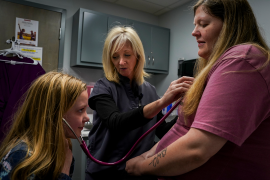By Monica Bharel, a 2011–12 fellow
As a physician, I have worked with low-income people in city hospitals, veterans' administration hospitals, and community health centers, as well as within homeless programs. While providing this care, I began to ask myself how I could improve the overall health of my patients—and not just step in when they were sick or in crisis.
When I applied to the Mongan Commonwealth Fund Fellowship in Minority Health Policy, I was the medical director of the Boston Health Care for the Homeless Program, which sees more than 12,000 homeless patients at 80 sites. I enjoyed overseeing our medical work, developing new programs, and supervising our medical staff. My role allowed me to contribute meaningfully to our program's structure and to improve the quality of care we were providing. But I hoped that the fellowship would enable to me to look at other ways I could have an impact on the lives of my patients.
I was thrilled to be accepted to the class of 2012 and soon found that the fellowship exceeded my expectations. The classes at the Harvard School of Public Health were practical, challenging, and eye-opening. Over the year, I began to build a systematic method to thinking about the problems my patients were experiencing and started to form new connections and avenues for solutions. I gained confidence in my understanding and use of data. I also learned how best to convey the needs of my patients to policymakers.
However, the real value for me came from what the fellowship offered outside of the classroom. The opportunity to develop project management and cooperation skills with my fellow classmates through our youth violence prevention project was irreplaceable. And the chance to reflect on my leadership style with program director Joan Reede, M.D., my colleagues, and other trusted supporters has helped me to build on my strengths and accept my weaknesses. I am still connected to many of the inspiring mentors who were available to me during the fellowship.
Some of the insights I gained through the fellowship have changed the way I do my daily work. First, many policy decision-makers do not have a deep understanding of the needs of the vulnerable populations, but are willing to listen to people with expertise in the field. By speaking out, those of us with working experience can make a difference in policy decisions at local, state, and federal levels. Second, health providers tend to work in silos of our own disciplines; when we communicate more effectively, we can achieve common goals. Third, there are mentors and advisors who are willing to help us move our agendas forward. And finally, if we don't do the work to change the policies and systems for vulnerable populations, it won't happen. By learning the tools of advocacy and policy, we can ensure that the Affordable Care Act and other reforms meet the needs of the most vulnerable among us.
After my fellowship year, I returned to the Boston Health Care for the Homeless Program and was promoted to the role of chief medical officer. In this role I oversee our research, advocacy, and quality work. My training has allowed me to more effectively promote the needs of homeless individuals in my work with local, state, and federal agencies and other organizations. For example, I have worked to help ensure health care payment reforms do not inadvertently widen health care disparities for the homeless.
In light of my experience, I would advise anyone who is interested in improving health delivery systems to consider this fellowship.



